The emerging scenario has bamboozled observers on either side of the Atlantic. While the US and North Korea are inching towards a possible rapprochement over nuclear and missile tests, Iran has upped the ante in its dealings with Donald Trump’s America.
The diplomacy of the State Department is on test. As much quite plainly is the import of Tuesday’s threat by Tehran that it will withdraw from the treaty on the non-proliferation of nuclear weapons should the incumbent at the White House pull the US out of the nuclear deal, concluded by Barack Obama in 2015.
It is a tangled skein of international nuclear deterrence, and should the parallel threats materialise, a signal initiative by the previous US President will be reduced to irrelevance. Hasan Rouhani’s government in Tehran has let it be known that Iran was mulling “surprising actions” if the nuclear deal is scrapped, and that leaving the NPT, which is designed to prevent the spread of nuclear weapons, is an option.
“The NPT acknowledges the right for all its member-states to leave the treaty if their interests are endangered,” was the message conveyed by Ali Shamkhani, the secretary of Iran’s supreme national security council. He has couched his caveat in a statement of fact ~ “The NPT acknowledges the right for all its member-states to leave the treaty if their interests are endangered. It will not be very pleasant if Trump sabotages (the) nuclear deal.”
In effect, the administration of the moderate Rouhani has made its position clear a fortnight before the 12 May deadline. Trump will have to decide on two crucial options ~ he will either have to sign a presidential waiver on sanctions against Iran or withdraw from the nuclear accord. If the second option is executed, Tehran has made it known that it will not be unresponsive to America’s contemplated offensive.
It is pretty obvious that the White House has thus linked a fresh cache of sanctions to matters nuclear. A possible crisis appears to have been precipitated with Trump’s recent appointment of what they call “Iran hawks”, notably the National Security Adviser, John Bolton.
He had refused to certify Iran’s compliance with the nuclear agreement last year, but has thus far stopped short of cancelling US participation in the deal, which envisages a loosening of sanctions in exchange for curbs on Tehran’s nuclear programme.
That said, the fact remains that President Trump’s proposed plan of action runs counter to the repeated confirmations by the International Atomic Energy Agency, specifically that Tehran has been complying with the agreement.
As much is the subtext of President Rouhani’s robust counter-blast on Wednesday ~ “A successful foreign policy means increasing enemies’ expenses, and if the United States violated the joint comprehensive plan of action or the nuclear deal, they will pay the highest price and Iran will pay the lowest price.” In a way, therefore, both countries are on test; it is a war of nerves as the deadline approaches.











